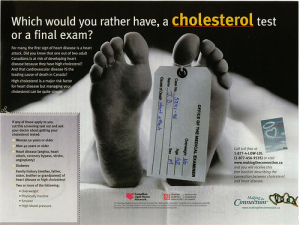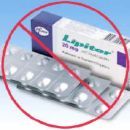 Thursday, August 29, 2013
Thursday, August 29, 2013
A 'new' study of statin medications has just been published in the Journal of the American College of Cardiology. I say new, but actually its a new manipulation of old data.
The researchers looked at eight previously conducted clinical trials done on statins. The population studied was elderly people without existing cardiovascular disease. After doing their calculations, it was concluded that statins did slightly reduce the risk of heart attack and stroke, but the use of statins did not reduce the risk of death from cardiovascular disease. There was also no reduction in the risk of death from all causes.
The bottom line is that it has once again been established that statins do not extend life expectancy for people without cardiovascular disease.
This is one of the key points that STATIN NATION exposes. The video excerpt below provides a summary of this issue:
A Bit More Detail
Around 75% of all the people who take a statin, are taking it for primary prevention. This means they do not have a heart problem but are taking the medication in the hope of preventing a heart problem in the future. When it comes to primary prevention none of the largest clinical trials have been able to conclusively show any net benefit.
The AFCAPS (1), ASCOT (2), CARDS (3), PROSPER (4) and WOSCOPS (5) clinical trials all failed to show a statistically significant reduction in all cause mortality (deaths from all causes, not just heart disease related deaths).
All cause mortality data, of course, is the only true measure one can use to determine if a statin is going to extend life expectancy or not. Whilst some clinical trials of statins have shown a very slight reduction in heart disease, in primary prevention, this has always been countered by deaths from other causes. The net result is that people do not live any longer after taking a statin.
In 2010, a meta-analysis of 11statin trials was published in the Archives of Internal Medicine. Professor Kausik Ray and colleagues concluded that statins provided no benefit in terms of deaths from all causes, when used for primary prevention (6). This analysis had the “cleanest” dataset of any analysis completed to date - the researchers were able to exclude patients with existing heart disease (known as secondary prevention) and only include data associated with primary prevention.
When we look at the use of statins for people who already have a diagnosed heart problem (the 25% of people, in secondary prevention) the picture becomes less clear cut. Some trials have found significant increases in life expectancy for these people, however, the trials have always been too short for us to assess the long-term impact of being on a statin.
Even if statins do provide a short-term benefit for those with a heart problem, it is debatable that this has anything to do with the cholesterol-lowering effect of statins. Quite simply, the amount of benefit does not match up with the degree of cholesterol-lowering. The potential beneficial affects of statins for people with heart disease is now widely recognised to be associated with a reduction in inflammation. And recent evidence suggests that this is mediated through an improvement in iron metabolism (7).
“Benefits Outweigh Risks”
Any decision to take a medication should of course involve a clear understanding of the benefits balanced against the risks. Many authorities have repeatedly stated that the benefits of statins far outweigh the risks. Clearly, this is not correct.
First of all, as we have seen above, there is no net benefit for the 75% of people who take a statin in primary prevention. So, for these people, the choice should be abundantly clear, since they will only expose themselves to the significant adverse effects associated with statins.
Statins have been linked with more than 300 different adverse effects. The most common adverse effects include: depression, suicide, sleep disturbances, memory loss, sexual dysfunction, lung disease, muscle-related problems, cognitive loss, neuropathy, pancreatic dysfunction and liver dysfunction. More recent studies have also shown that statins cause type 2 diabetes and acute kidney injury.
In addition, many doctors are concerned about statins and a potential increase in the risk for cancer and heart failure. A recent study found that the long term use of statins doubles the risk of breast cancer in women.
The best estimates suggest that at around 20% of the people who take a statin will experience significant adverse effects. This needs to be considered when thinking about both primary and secondary prevention, since this 20% is a much greater number than the number of people who might benefit, even in secondary prevention.
References:
1. Downs JR, et al. Primary prevention of acute coronary events with lovastatin in men and women with average cholesterol levels: results of AFCAPS/TexCAPS. Air Force/Texas Coronary Atherosclerosis Prevention Study. JAMA 1998; 279:1615-22.
2. Sever PS, et al. Prevention of coronary and stroke events with atorvastatin in hypertensive patients who have average or lower-than-average cholesterol concentrations, in the Anglo-Scandinavian Cardiac Outcomes Trial-Lipid Lowering Arm (ASCOT-LLA): a multicentre randomised controlled trial. Lancet 2003; 361:1149-1158.
3. Clhoun HM, et al. Primary prevention of cardiovascular disease with atorvastatin in type 2 diabetes in the Collaborative Atovastatin Diabetes Study (CARDS). Lancet 2004; 364:685-696.
4. Pravastatin in elderly individuals at risk of vascular disease (PROSPER): a randomised controlled trial. Lancet 2002; 360:1623-1630.
5. Shepherd J, et al. Prevention of coronary heart disease with pravastatin in men with hypercholesterolemia (WOSCOPS). N Engl J Med 1995; 333:1301-1307.
6. Ray KK, et al. Statins and all-cause mortality in high-risk primary prevention: a meta-analysis of 11 randomized controlled trials involving 65,229 participants. Arch Intern Med. 2010; 170:1024-31.
7. Zacharski, LR et al. The Statin–Iron Nexus: Anti-Inflammatory Intervention for Arterial Disease Prevention. American Journal of Public Health. Published online ahead of print February 14, 2013.
==============================================================================================================
Read the complete article here.
The researchers looked at eight previously conducted clinical trials done on statins. The population studied was elderly people without existing cardiovascular disease. After doing their calculations, it was concluded that statins did slightly reduce the risk of heart attack and stroke, but the use of statins did not reduce the risk of death from cardiovascular disease. There was also no reduction in the risk of death from all causes.
The bottom line is that it has once again been established that statins do not extend life expectancy for people without cardiovascular disease.
This is one of the key points that STATIN NATION exposes. The video excerpt below provides a summary of this issue:
A Bit More Detail
Around 75% of all the people who take a statin, are taking it for primary prevention. This means they do not have a heart problem but are taking the medication in the hope of preventing a heart problem in the future. When it comes to primary prevention none of the largest clinical trials have been able to conclusively show any net benefit.
The AFCAPS (1), ASCOT (2), CARDS (3), PROSPER (4) and WOSCOPS (5) clinical trials all failed to show a statistically significant reduction in all cause mortality (deaths from all causes, not just heart disease related deaths).
All cause mortality data, of course, is the only true measure one can use to determine if a statin is going to extend life expectancy or not. Whilst some clinical trials of statins have shown a very slight reduction in heart disease, in primary prevention, this has always been countered by deaths from other causes. The net result is that people do not live any longer after taking a statin.
In 2010, a meta-analysis of 11statin trials was published in the Archives of Internal Medicine. Professor Kausik Ray and colleagues concluded that statins provided no benefit in terms of deaths from all causes, when used for primary prevention (6). This analysis had the “cleanest” dataset of any analysis completed to date - the researchers were able to exclude patients with existing heart disease (known as secondary prevention) and only include data associated with primary prevention.
When we look at the use of statins for people who already have a diagnosed heart problem (the 25% of people, in secondary prevention) the picture becomes less clear cut. Some trials have found significant increases in life expectancy for these people, however, the trials have always been too short for us to assess the long-term impact of being on a statin.
Even if statins do provide a short-term benefit for those with a heart problem, it is debatable that this has anything to do with the cholesterol-lowering effect of statins. Quite simply, the amount of benefit does not match up with the degree of cholesterol-lowering. The potential beneficial affects of statins for people with heart disease is now widely recognised to be associated with a reduction in inflammation. And recent evidence suggests that this is mediated through an improvement in iron metabolism (7).
“Benefits Outweigh Risks”
Any decision to take a medication should of course involve a clear understanding of the benefits balanced against the risks. Many authorities have repeatedly stated that the benefits of statins far outweigh the risks. Clearly, this is not correct.
First of all, as we have seen above, there is no net benefit for the 75% of people who take a statin in primary prevention. So, for these people, the choice should be abundantly clear, since they will only expose themselves to the significant adverse effects associated with statins.
Statins have been linked with more than 300 different adverse effects. The most common adverse effects include: depression, suicide, sleep disturbances, memory loss, sexual dysfunction, lung disease, muscle-related problems, cognitive loss, neuropathy, pancreatic dysfunction and liver dysfunction. More recent studies have also shown that statins cause type 2 diabetes and acute kidney injury.
In addition, many doctors are concerned about statins and a potential increase in the risk for cancer and heart failure. A recent study found that the long term use of statins doubles the risk of breast cancer in women.
The best estimates suggest that at around 20% of the people who take a statin will experience significant adverse effects. This needs to be considered when thinking about both primary and secondary prevention, since this 20% is a much greater number than the number of people who might benefit, even in secondary prevention.
References:
1. Downs JR, et al. Primary prevention of acute coronary events with lovastatin in men and women with average cholesterol levels: results of AFCAPS/TexCAPS. Air Force/Texas Coronary Atherosclerosis Prevention Study. JAMA 1998; 279:1615-22.
2. Sever PS, et al. Prevention of coronary and stroke events with atorvastatin in hypertensive patients who have average or lower-than-average cholesterol concentrations, in the Anglo-Scandinavian Cardiac Outcomes Trial-Lipid Lowering Arm (ASCOT-LLA): a multicentre randomised controlled trial. Lancet 2003; 361:1149-1158.
3. Clhoun HM, et al. Primary prevention of cardiovascular disease with atorvastatin in type 2 diabetes in the Collaborative Atovastatin Diabetes Study (CARDS). Lancet 2004; 364:685-696.
4. Pravastatin in elderly individuals at risk of vascular disease (PROSPER): a randomised controlled trial. Lancet 2002; 360:1623-1630.
5. Shepherd J, et al. Prevention of coronary heart disease with pravastatin in men with hypercholesterolemia (WOSCOPS). N Engl J Med 1995; 333:1301-1307.
6. Ray KK, et al. Statins and all-cause mortality in high-risk primary prevention: a meta-analysis of 11 randomized controlled trials involving 65,229 participants. Arch Intern Med. 2010; 170:1024-31.
7. Zacharski, LR et al. The Statin–Iron Nexus: Anti-Inflammatory Intervention for Arterial Disease Prevention. American Journal of Public Health. Published online ahead of print February 14, 2013.
==============================================================================================================
Read the complete article here.





















